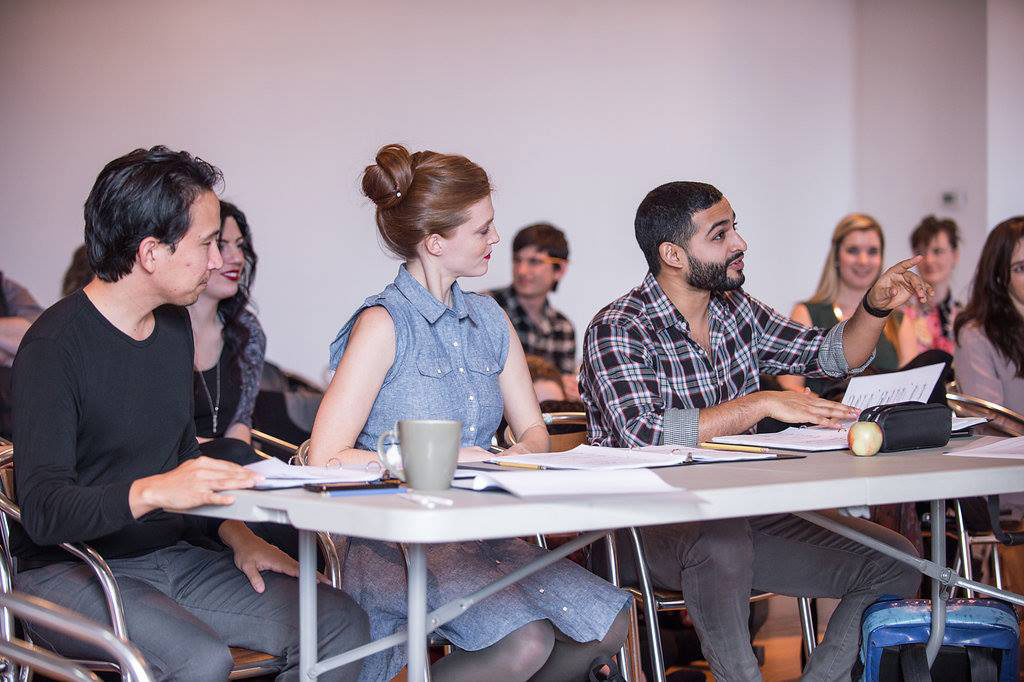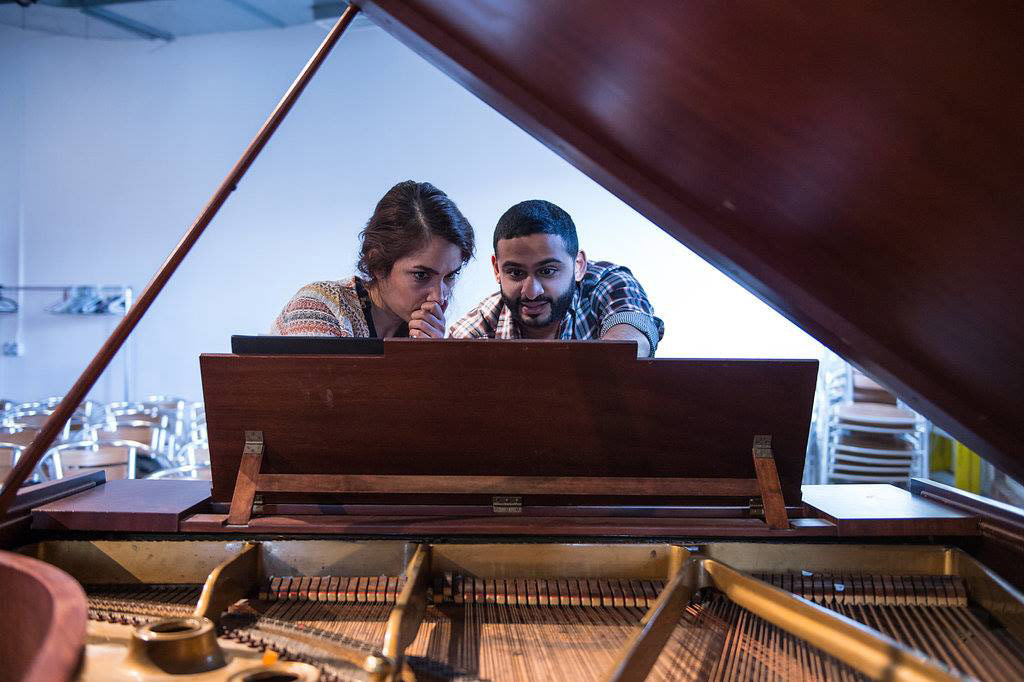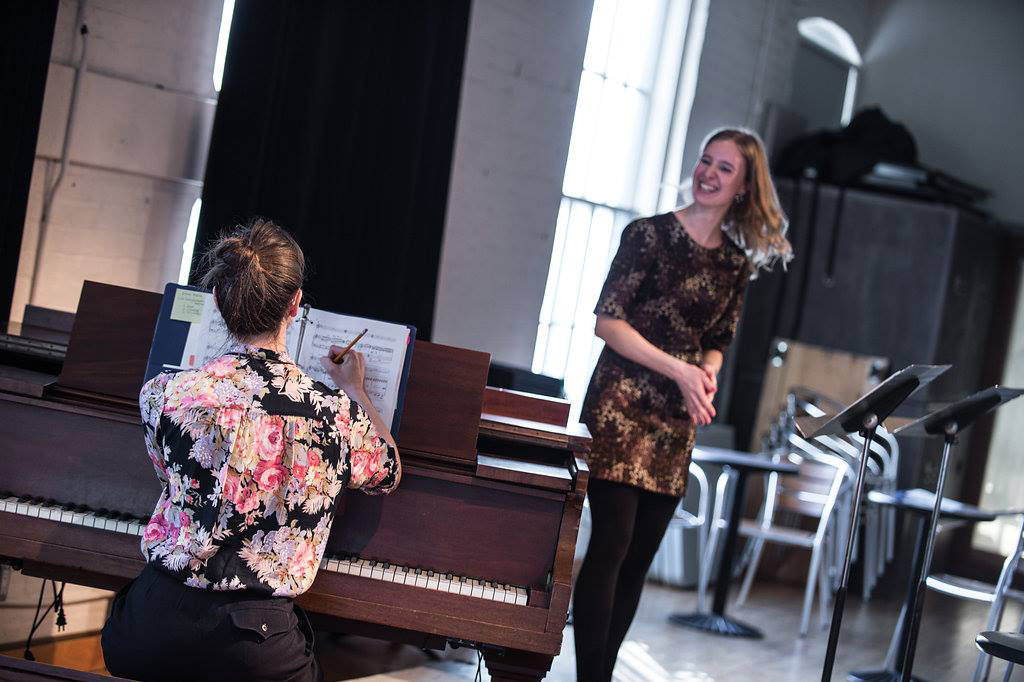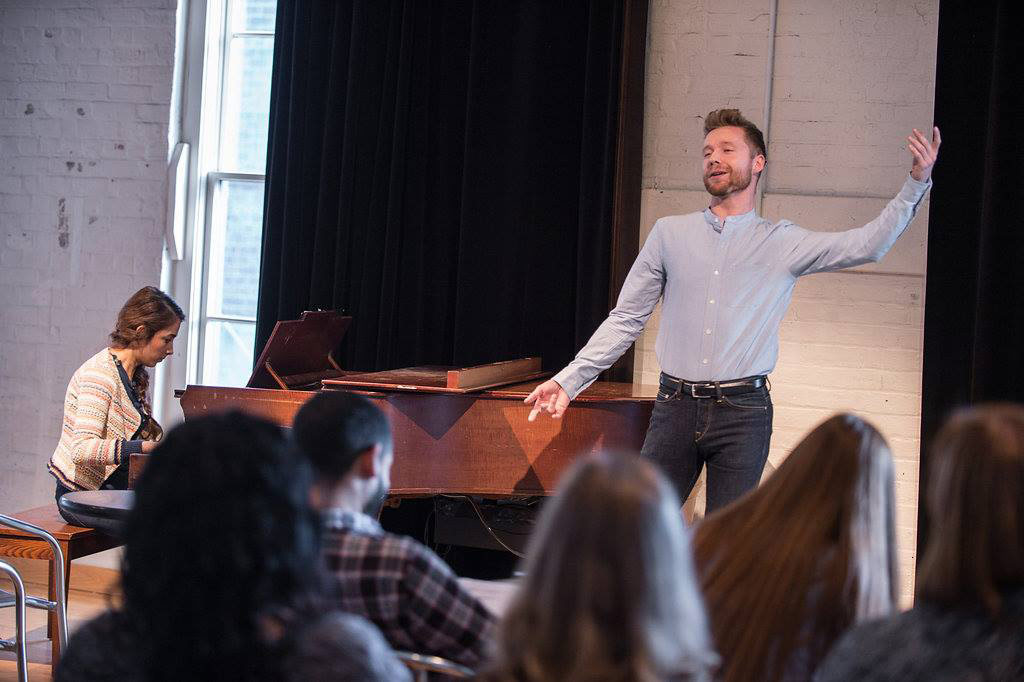
He said/she said: Songbook VI
ReviewJenna: This past weekend marked the sixth in Tapestry Opera’s Songbook series, which present new Canadian opera, performed by emerging Canadian artists. It sounds like a simple concept, but these workshop-showcase concerts are consistently an intense and memorable event.
Greg: Saturday night at the Ernest Balmer Studio in the Distillery District is one of my favourite things as of late, and this past Saturday’s Songbook VI was no exception. Tapestry Opera presented to us a selection of Canadian operatic works by some of today’s hottest up-and-coming artists. Led by mezzo-soprano Wallis Giunta and music director Jordan de Souza, the night saw a total of eleven singers and six pianists who all make up the “New Opera 101” Program. They presented excerpts from works housed in the Tapestry Opera library, which, #LetItBeKnown, is a treasure trove of new music that should be heard over, and over again.

Jenna: As Songbook VI unfolded, I was struck early on by the depth of understanding these young artists had of their scenes. So often, the repertoire seemed perfectly suited to the singer; their characters seemed an extension of themselves, and their voices were comfortable and free to play. It’s a big deal that Tapestry Opera has such a comprehensive library of music; the artists were thoughtfully assigned their scenes, and it’s exciting to know that there was so much Canadian opera to choose from and find a great fit.
Greg: All the singers and pianists did an incredible job portraying some not only difficult music to sing, but difficult situations and characterizations. Kudos! My hat’s off to you!!
I’ll talk about a few of the pieces that were standouts for me. I have to say that some of the most astounding singing of the night came from soprano Beth Hagerman. In her first foray, a piece entitled Dark Star Requiem (composer: Andrew Staniland, librettist: Jill Battson) we heard Hagerman bring us “Beautymark Aria” in which she plays a sultry personification of HIV. Her exquisite diction was key to presenting such a sensual description of symptoms from inside out. It was chilling. In her second outing, alongside tenor William Ford, we saw a scene by composer James Rolfe with a libretto by Camyar Cha called “Rosa”. In this scene a husband tracks down his lost wife who is coping in a dark way with the loss of their daughter. The scene was electric and definitely made me want to be a director.
Jenna: The night was perfect for anyone with a short attention span, and each scene was engrossing from the start. The stories in Songbook VI were often heavy, and it was a cathartic evening, full of that awesome combination of great artists and great pieces. There were a few highlight performances for me, like tenor Jonathan MacArthur’s starter, “Waiter’s Aria” from Omar Daniels’ The Shadow, with pianist Asal Iranmehr. He had the magnetic air of a great emcee, and he set up an easy vibe to the show with a few opera singer gags and a great sense of humour.

Jenna: Soprano Beth Hagerman was a standout artist of the night, particuarly in the “Beautymark Aria”, from Dark Star Requiem by Jill Battson and Andrew Staniland, with Evelina Soulis at the piano; the aria is sung by a personification of the HIV virus, and it’s a terrifying thing to watch. Hagerman showed maturity and skill with this scene, and her full, thrilling voice suggests we’ll hear more from her in seasons to come.
Greg: Tenor Jonathan MacArthur opened the night with “Waiter’s Aria” from The Shadow by Omar Daniel and libretto by Alex Poch-Goldin. In this scene a miffed waiter recounts that he’s being forced to sing to us in the prologue, because they neglected to notice he was better than the lead. It was hilarious. MacArthur’s voice has grown a lot over the last year, and as he blossoms a bit more in to fuller lyric territory, I can’t wait to see what choices he makes next! He was definitely the comic relief of the night (something I can appreciate) and his second piece, from The Colony by Kevin Morse with libretto by Lisa Codrington, we see an exterminator basking in the glory of the death he causes.
Jenna: In two scenes that couldn’t have differed more, soprano Whitney Mather was charming and tragic, and constantly drawing in her audience. She showed some exciting vocal chops in “And So I Killed a Man” from The Laurels, by Jeffrey Ryan and Michael Lewis MacLennan, played by pianist David Eliakis; later, she sang in the second of two scenes from She Sees Her Lover in the Light of Morning, and she had our hearts.
Greg: In The Blind Woman (featured in LibLab 2014) with music by James Rolfe and libretto by David Yee, we have soprano Sara Schabas portraying a dancer who’s losing her sight. This piece is a duet for her and her shadow, sung by mezzo-soprano Shauna Yarnell. Their voices blended beautifully and it was quite a moving piece.
Yarnell followed up later with a piece we’ve heard before, but that doesn’t mean I love it any less, from Mother Everest, with music by Abigail Richardson and my favourite Candian librettist right now, Marjorie Chan. In this piece Yarnell sang the role of a yoga-driven mountain climber who discovers after meditation longer than anticipated, her sherpa has died in his sleep. It’s moving and a great fit for Yarnell. It shows off her voice and gives her a chance to flex some acting chops. Her shriek at the moment of discovery of the dead sherpa gave me chills.
Jenna: Of course, the two numbers by Wallis Giunta and Jordan de Souza at the piano were both stunners. Giunta sounded the best I’ve heard her yet, and it was clear that she found a connection to this music. She was touching in “Chopin’s Pearls” from Gareth Williams and David James Brock’s The Sloans Project/Pub Operas; she took huge vocal risks, yet never stopped speaking to her listeners. She brought her sense of humour to the grande finale, “It’s My Wedding” from British composer Jonathan Dove’s The Enchanted Pig. The insane freakout of a bridezilla is hilarious needs to become an immediate recital staple, and Wallis was totally hilarious.

Greg: Tapestry ended each half of the program with offerings by Giunta with de Souza at the keys. First half she shared “Chopin’s Pearls” from the Sloans Project/Pub Operas. A work with a great story behind it. These are compiled stories from one of the world’s oldest working public houses in the British Isles and this tells the tale of a barmistress who falls in love with a visiting pianist - none other than the phenomenal Fréderic Chopin, while the house pianist loves her unrequitedly from afar.
In the second half, we got what was probably my favourite piece of the night, “It’s My Wedding” from The Enchanted Pig, by Jonathan Dove with a libretto based on a Romanian folk tale by Alasdair Middleton. These two pieces were probably the best I’ve heard Giunta sing. We’re all well aware of her Handel and Mozart chops, but these two were almost parallel with German cabaret in their presentation and vocalization. I thought she was freer and truer to herself than I’m used to seeing; being in the intimate space that is the Balmer studio helped bridge that gap for sure. I’d love to hear her do more contemporary stuff as I think she shines better in this milieu.

Greg: I have to give a SERIOUS shout out to the pianists though. #TripleSwoonTimesInfinity. David Eliakis, Asal Iranmehr, Evelina Soulis, Natasha Fransblow, Ethan Rotenberg and Anastasia Tschernikova all played remarkably well. Some of the pieces were incredibly difficult, and there was no question that these musicians were more than capable of not only delivering all the colours of an orchestra, but supporting and making music with the singers who are also doing some pretty crazy things with their voices is a true testament the to the level of artistry they’ve reached. Bravissimi tutti!
Jenna: The coolest part of Songbook VI is the fact that I’d heard many of the scenes before. These showcases are accomplishing exactly what Tapestry means them to accomplish, which is getting listeners familiar with Canadian opera. Pieces like James Rolfe and David Lee’s The Blind Woman, Sanctuary Song by Abigail Richardson and Marjorie Chan, and Oubliette by Ivan Barbotin and Donna-Michelle St. Bernard, have come up for the second, third, and even fourth time in my last few seasons’ worth of hearing Tapestry Opera. This means that out of the largely unknown collection of Canadian opera, there are favourites emerging, select “hits” that are well-received and loved by the artists.
Greg: All in all, I hope Michael Mori and the team at Tapestry Opera are as impressed as I was with all the performances. It was a wonderful way to spend a Saturday evening. Stay tuned to Tapestry for next year’s Songbook presentation, but also, their upcoming presentations as well which are sure to thrill.
And let’s all make a promise to go see more new Canadian opera. It’s the only way we’re going to get to hear these amazing pieces more than once.
Jenna: Up next for Tapestry Opera is the North American premiere of Stuart MacRae and Louise Welsh’s The Devil Inside, a co-commission and co-production with Scottish Opera and Music Theatre Wales. Shows run March 10-13 at Harbourfront Theatre Centre. For details and ticket information, follow our box office links below.


Comments